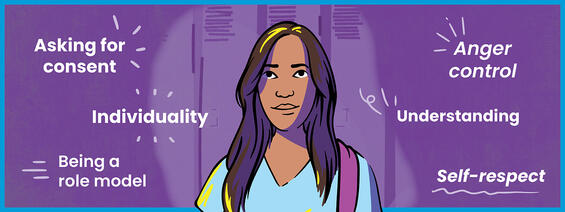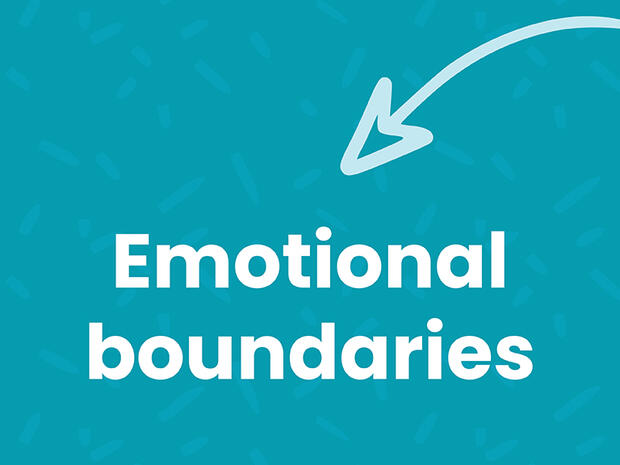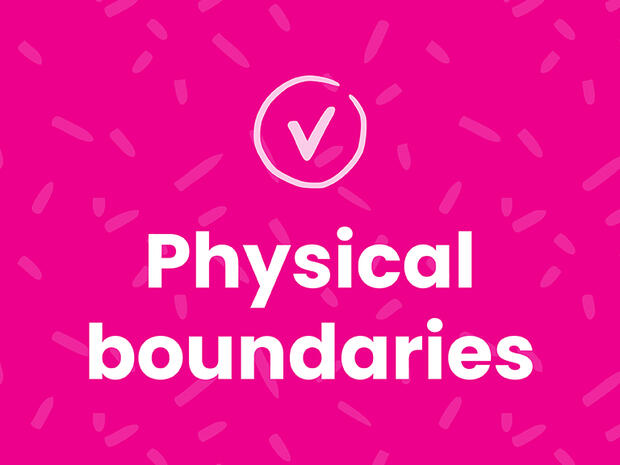Healthy characteristics in your relationship
- Mutual respect: valuing each other and understanding boundaries
- Trust: feeling confident you have each other's back
- Honesty: being truthful with each other
- Compromise: acknowledging and respecting different points of view
- Good communication: respecting each other’s need to speak honestly and openly
- Fighting fair: finding solutions to differences of opinion by sticking to the subject and avoiding insults
- Problem solving: working together to break down problems and identify solutions
(Adapted from Youth.gov)
Healthy characteristics in yourself
- Individuality: supporting each other while also staying true to yourselves
- Anger control: having the ability to feel angry without lashing out
- Understanding: taking time to recognize what the other person may be feeling
- Self-respect: valuing things about yourself that make you who you are
- Being a role model: showing respect to others can help you earn respect in return
- Asking for consent: actively checking in on the other person’s emotional, physical, and digital boundaries
(Adapted from Youth.gov)

Understanding personal boundaries
Emotional
Emotional boundaries can impact your feelings, moods, and sense of trust and security.
Ask yourself…
- How do you feel around a particular person?
- Are your moods different when you’re around them?
- Do certain words or actions make you feel nervous and uncomfortable?
Physical
Physical boundaries can impact your body, privacy, and personal space.
Ask yourself…
- What kind of physical contact are you okay with? Holding hands? Hugging? Kissing?
- Are you comfortable inviting people to your house? Visiting someone else’s house?
- Are you comfortable telling friends when you need to eat or rest?
Digital
Digital boundaries are about your phone, computer, or online activities.
Ask yourself…
- How often do you want to call, text, or message with someone?
- Are you comfortable with people posting pictures of you or talking about your relationship on social media?
- Are you comfortable saying no when a friend or partner asks to see your phone?
- Do you respect these examples from others?

Setting personal boundaries
The best way to set clear personal boundaries is with honesty and open communication. You should feel comfortable expressing your needs, wants, fears, hopes, and limits and being truthful about how certain situations or behaviors make you feel.
Start the conversation
Now that you have a better understanding of your personal boundaries, you can discuss them with your partner. Consider starting the conversation with statements like, “It’s important to me when…” or “I need you to know I feel strongly about…” so your partner knows you want to communicate your needs, but not be critical of them.
If you want to learn about someone else’s boundaries, don’t be afraid to ask. Start with questions such as:
- “Are you ok when…”
- “How could we let each other know if something isn’t going well?”
- “What are some of your personal boundaries that are important for me to know?”
Once you and your partner have both communicated your personal boundaries, it’s important to respect them. And it’s okay to check in occasionally with your partner, as boundaries can change over time.

What to do when boundaries aren't respected
You get to decide if a relationship is no longer good for you, and if your partner isn’t respecting your boundaries, it may be time to move on in a safe, respectful way.
If someone else needs to end their relationship with you because their boundaries were crossed it’s important to respect their decision and not make them feel bad or unsafe in any way. Remember, they get to decide what is best for them and not fear retaliation.
If you’re not sure how someone else is feeling, ask them, and if you have crossed someone’s personal boundaries, apologize, and own your mistake.
It’s normal to feel sad or disappointed if your relationship ends. If you need to talk, find a trusted adult, or reach out to an advocate: you can call the 24/7 National Dating Abuse Helpline at 1-866-331-9474, text loveis to 22522, or chat online. You can also find more resources on loveisrespect.org.

Learn more about unhealthy relationships
Now that you can recognize the signs of a healthy relationship and talk about personal boundaries, take the time to learn more about unhealthy relationships and what you can do about them.
Take the healthy relationships quiz
Wondering if your relationship is healthy? Take this quiz.
Find more tools and resources
Find local teen dating abuse help in Massachusetts, national hotlines and tools, and RESPECTfully MA social media.



